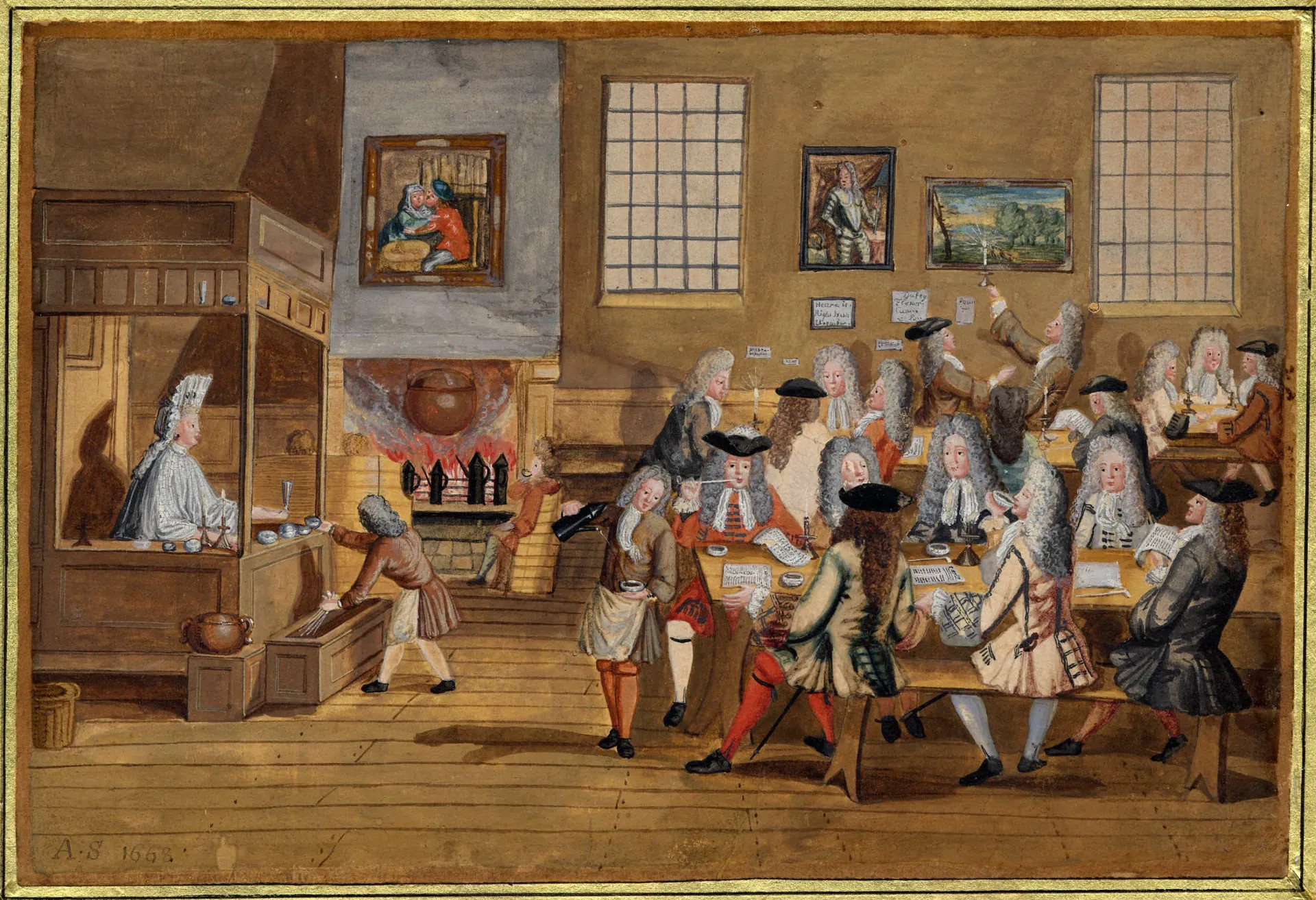I caffè come infrastrutture della società / Cafés as Infrastructures of Society

—Il caffè è il parlamento del popolo. —
Honoré de Balzac
Dalla Costantinopoli del XVI secolo ai coworking travestiti da bar del XXI, i caffè non sono mai stati solo luoghi. Sono laboratori sociali: lì si incontrano generazioni diverse, si commenta la politica, si stringono affari, si immaginano rivoluzioni.
Quando arrivarono in Europa, i caffè furono subito riconosciuti come spazi pericolosi: troppo fermento, troppe idee. A Londra li chiamavano Penny Universities, perché con il costo di una tazza si poteva ascoltare un dibattito tra filosofi, mercanti e giornalisti. A Parigi furono il cuore dell'Illuminismo: qui circolavano i primi giornali e si scrivevano pamphlet che avrebbero acceso la Rivoluzione. A Vienna, tra divani di velluto e quotidiani appesi come panni al vento, nacque una cultura mitteleuropea, cosmopolita e critica verso il potere.
La storia della politica internazionale passa spesso tra i tavolini. Nelle città coloniali dell'Ottocento, i caffè furono il primo luogo dove le élite locali poterono confrontarsi con le idee liberali europee. Ad Alessandria d'Egitto gli attivisti nazionalisti si riunivano in locali mal illuminati per discutere di autodeterminazione. A Tunisi e Algeri i caffè divennero spazi di sorveglianza: polizia e intelligence li consideravano incubatori di dissenso e reti clandestine.
Nel Novecento, i caffè continuarono a modellare la storia: rifugi per dissidenti, redazioni improvvisate per giornali proibiti, avamposti culturali contro i totalitarismi. Nella Belgrado degli anni '90, durante le guerre balcaniche, furono luoghi di resistenza civile. Nelle metropoli sudamericane, da Buenos Aires a Santiago, bar e caffè erano il cuore delle lotte studentesche e sindacali.
Un filo rosso attraversa i decenni: ogni volta che un regime vuole controllare la società, inizia chiudendo i caffè.
Ma anche oggi la geografia del potere si legge attorno ai banconi. In Medio Oriente, il controllo dei caffè dove si fuma narghilè coincide spesso con il controllo dello spazio pubblico maschile. In Cina, i caffè indipendenti sono osservati con attenzione: troppi laptop, troppe conversazioni critiche. A Teheran le serrande si abbassano appena la socialità diventa potenzialmente politica.
Sul fronte economico, la diffusione delle grandi catene racconta un'altra storia: l'espansione silenziosa di un'egemonia culturale globale. Dove restano solo brand replicabili, la socialità si fa più debole: l'identità locale evapora nella standardizzazione. Al contrario, nei caffè indipendenti si addensa spesso la vitalità civica. Lì si progettano movimenti, startup, comunità.
E poi c'è la trasformazione digitale: i caffè ospitano lavoratori nomadi, riunioni improvvisate, influencer e analisti politici in smart working. Lì si costruiscono reti, anche geopolitiche: imprenditori africani che discutono con investitori cinesi, studenti mediorientali che pianificano campagne per i diritti civili.
In tempi di polarizzazione e solitudini digitali, i caffè sono una delle ultime infrastrutture della conversazione reale. Sono piazze coperte, dove ci si guarda negli occhi.
Se ancora oggi vogliamo una sfera pubblica vitale, basterà non dimenticarci questo dettaglio semplice: la democrazia può iniziare da un tavolino, due sedie e una tazza di caffè.
Antonio Mazzanti
Cafés as Infrastructures of Society
— "The café is the people's parliament." —
Honoré de Balzac
From sixteenth-century Constantinople to the coworking spaces disguised as coffee shops of the twenty-first, cafés have never been just places. They are social laboratories — where generations meet, politics is debated, deals are made, and revolutions imagined.
When they first arrived in Europe, cafés were immediately recognized as dangerous spaces: too much ferment, too many ideas. In London they were called Penny Universities, because for the price of a cup one could listen to debates among philosophers, merchants, and journalists. In Paris they became the heart of the Enlightenment: here the first newspapers circulated, and pamphlets were written that would ignite the Revolution. In Vienna, among velvet sofas and newspapers hung like laundry, a cosmopolitan, Central European culture critical of power took shape.
The history of international politics has often passed between café tables. In nineteenth-century colonial cities, cafés were the first places where local elites could engage with liberal European ideas. In Alexandria, Egypt, nationalist activists gathered in dimly lit establishments to discuss self-determination. In Tunis and Algiers, cafés became spaces of surveillance — watched by police and intelligence services that saw them as incubators of dissent and clandestine networks.
In the twentieth century, cafés continued to shape history: refuges for dissidents, improvised newsrooms for banned newspapers, cultural outposts against totalitarianism. In Belgrade in the 1990s, during the Balkan wars, they were hubs of civil resistance. In South American metropolises, from Buenos Aires to Santiago, bars and cafés formed the beating heart of student and labor movements.
A red thread runs through the decades: whenever a regime seeks to control society, it begins by closing the cafés.
But even today, the geography of power can be read around the counters. In the Middle East, control over shisha cafés often coincides with control over male public space. In China, independent cafés are closely monitored — too many laptops, too many critical conversations. In Tehran, shutters come down as soon as socializing turns potentially political.
On the economic front, the spread of major chains tells another story: the quiet expansion of a global cultural hegemony. Where only replicable brands remain, social life grows weaker — local identity evaporates into standardization. Conversely, independent cafés often concentrate civic vitality. There, movements, startups, and communities are born.
Then comes the digital transformation: cafés now host nomadic workers, spontaneous meetings, influencers, and policy analysts working remotely. They are places where networks — even geopolitical ones — are built: African entrepreneurs talking with Chinese investors, Middle Eastern students planning civil rights campaigns.
In an age of polarization and digital loneliness, cafés remain one of the last infrastructures of real conversation. They are covered squares, where people still look each other in the eye. If we want a living public sphere today, we must remember this simple truth: democracy can begin with a table, two chairs, and a cup of coffee.
Antonio Mazzanti
